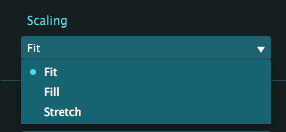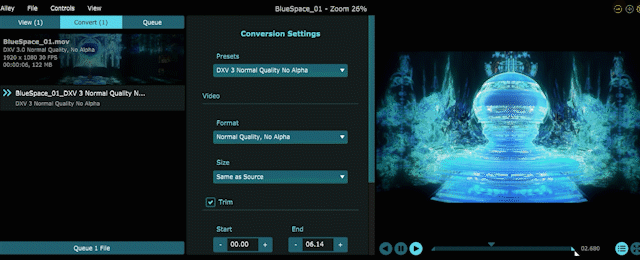resolume alley что это
Новости VJ программ
Содержание материала
RESOLUME
Пользователям как Mac, так и PC хорошо известна программа Resolume Avenue – великолепный виджейский инструмент с поддержкой до N видео-слоёв. Если Вы знакомы с программой Adobe Flash или Вы использовали Flash для создания видеообразов, то Resolume для Вас. Этот инструмент позволяет проигрывать флеш-анимацию, в том числе содержащую скрипты AS2 и AS3. Вам наверняка известно насколько мощным средством являются скрипты.
По сравнению с VJamm Pro цена на Resolume (€ 299.00) кажется несколько завышенной. Но зато Resolume может работать с множеством входных видео потоков и имеет простой (менее загромождённый различными элементами) пользовательский интерфейс.
Если Вы планируете использовать небольшое количество слоёв и множество видеопотоков, то Resolume будет для Вас хорошим выбором. Ещё одна сильная сторона этой программы – это видеомаппинг. Если Вы когда-либо работали с виджейскими программами, где обработка графики в реальном времени осуществляется за счёт написания кода, такими как VVVV, то Вам должно быть понятно, как иногда бывает трудно спроецировать видео на какой-нибудь физический объект. А с помощью Resolume всего за несколько кликов мышью можно выполнит маппинг на любой объект или поверхность. Кроме того проецирование можно выполнять даже на несколько объектов или поверхностей.
И хотя в Resolume нет встроенного секвенсора, и он не поддерживает функцию SMS-to-Screen, но этот инструмент может накладывать на входные аудиоканалы различные эффекты и смешивать каналы между собой. Также Resolume поддерживает работу с LFO – помимо стандартной синхронизации LFO с Audio/BPM (которая доступна и в VJamm Pro и в AVmixer Pro) можно вручную управлять LFO-сигналом, смешивать каналы и накладывать эффекты.
На Gearwire можно посмотреть видео ролик от Билла Холланда, рассказывающий о возможностях Resolume. На официальном сайте доступна демоверсия программы. Для образовательных учреждений возможно приобретение программы с 50% скидкой. Для работы Resolume требуется как минимум 1 Гб оперативной памяти, видеокарта ATI Radeon 9600 или NVIDIA GeForce FX 5200.
Video Conversion with Alley
Let’s face it. Only a special kind of masochist will really enjoy codecs and converting. Although some people may get a perverse pleasure out of getting deep into GOP structures, context-adaptive binary arithmetic coding and variance adaptive quantization, most of us just want to get on with making the screen go flashy flashy.
This is why we introduced the DXV codec and conversion tools in Alley. There’s no deep knowledge required. All you need to remember is DXV = love and Alley = life.
Converting in Two Clicks
After adding a file to Alley, of course using drag and drop like a boss, you will see a Convert button on the bottom of the list.
Go ahead and click that bad boy. The file will be added to the Convert list and Alley will switch to the Convert tab. Don’t worry about all the settings here, we’ll go into that later. Really all you need to is click in the same place, where there is now a Queue button.
Click that bad boy again and the file will start converting. Alley will switch to the Queue tab where you can monitor the conversion progress.
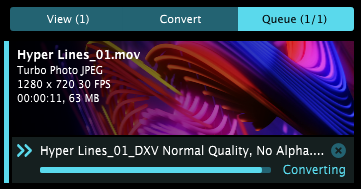
Told you this was simple.
Batch Conversion
Of course, you often need to convert multiple files at once.
In Alley, this is just as easy as converting a single file. You just add multiple files to the View list, select them all using CTRL-A (CMD-A on a Mac), hit that Convert button and then hit that Queue button.
Boom. Alley will utilise all your computer’s CPU cores to convert your files as quickly as possible. It will show you the overall progress in the bottom area where the Convert/Queue button was.
You can leave Alley do its thing and go back to what you were doing. When it’s done, you’ll find the DXV encoded versions right next to your original files.
Image Sequences
You can use Alley to convert an image sequence into a video.
Save your sequence in a separate folder, and make sure each image is named sequentially. Next, drag the folder in to Alley. Alley will see that the files are supposed to be a sequence and will display, cue and convert them as a single file.
Conversion Settings
Of course, after adding a file to the Conversion list, you can dig a little deeper to fine tune how it will be converted.
Video
 DXV Format
DXV Format
Here you can choose which flavor of DXV you want to encode to. You can read more about why DXV is so awesome and when to use each of those flavors here.
When in doubt, DXV Normal Quality, No Alpha is always a safe bet.
 Size
Size
This is where you define the size in pixels of your converted file. Usually, you’ll want to stick to Same as Source. If you need a specific size, you can choose from a list of often used resolutions, or enter specific custom values.
Scaling
Should you choose to render to a fixed resolution, you get to decide how the original image is fit into the new frame.
Use the slider below the monitor to trim your footage to length. More precise trim tools can be found under the conversion settings.
Audio
If your original file has an audio track, you can convert that right along with the video.
It will be converted to Linear PCM audio. You can adjust the Sample Rate and Bit Depth if you so desire.
Of course, you can choose to remove the audio track completely by unchecking the audio box.
Output Folder
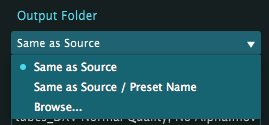
File Name
Presets
If you find yourself using particular conversion settings a lot, you’ll want to save those settings in a preset.
Alley ships with four presets for the four flavors of DXV, but you can add as many as you want.
First get your settings to where they’re juuuuust perfect.
When you change any value, you’ll notice the Preset dropdown changes to Custom. Open that Presets dropdown and hit Save. You can then choose a preset name, very similar to how presets work for effects and MIDI and OSC and all the things in Resolume.
Tip! Choose your preset name wisely, because it’s used for naming your files and folders. You can see that your converted filename updates when you change presets.
Bonus Tip! Every setting is part of the preset, including the Output Folder! This means you can choose to always convert your files to a particular place on your computer, like your Desktop.
Magical Power User Powers
There’s a few ways that you can speed up your conversion workflow and become a conversion super hero.
Convert with specific preset
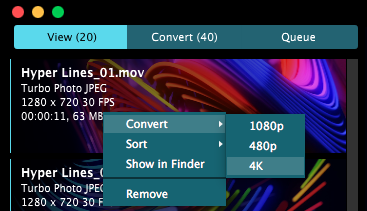
The file will then be added to the list automatically using the chosen preset.
This also works with multi selection!
Convert with multiple presets
After adding a file or files to the Convert list like this, the View list will stay focused. This will let you add the same files to the list again, this time using a different preset.
This will let you quickly prepare different resolution versions of the same file.
Adjust conversion settings
As we’ve seen, after adding a file to the Convert list, you can still fine tune its conversion settings. This also works when selecting multiple files and changing their settings simultaneously.
You can get really nitty gritty and use CTRL/CMD to select multiple conversion targets from the list, and dial in the settings for just those targets.
Queue specific files first
We’ve all been there. Y ou just got handed a crappy thumb drive with 12 GB of Youtube rips and Beeple clips, two minutes before show. You’re about to start the conversion process when the annoying tour manager comes running into front of house, shouting at you to get the DJ’s ugly spinning logo loop up right now!
After telling him or her to chill because you’re a professional, you can select just that file in the Convert list and hit the Queue button. That way, you know it’ll be done first. When it’s done, right-click to reveal it in your browser, get it up on the screen and then worry about the rest.
Resolume Alley 7.3.1 rev 72951
Resolume Alley – медиапроигрыватель, в большей степени предназначенный как вспомогательное средство для других продуктов Resolume. С его помощью можно воспроизводить видео, включая DXV, слушать музыку и смотреть изображения. Также включает в себя конвертер для преобразования файлов в DXV.
Resolume Alley обладает простым и минималистичным интерфейсом. Чтобы открыть файл, достаточно перетащить его в окно или выбрать через меню Open. Во время воспроизведения видео вы можете перематывать его и менять масштаб. Также вы можете добавить несколько файлов и создать плейлист.
В Resolume Alley есть конвертер, с помощью которого можно преобразовать файл в DVX. Для этого откройте видео, нажмите Convert и выберите выходные параметры. Также можно обрезать видео – для этого поставьте галочку возле метки Trim и введите время начала и конца ролика.
Особенности программы
Программу Resolume Alley можно скачать совершенно бесплатно.
Скачать бесплатно Resolume Alley 7.3.1 rev 72951
| Версия: | 7.3.1 rev 72951 |
| Русский язык: | Да |
| Разработчик: | Edwin de Koning and Bart van der Ploeg |
| Операционка: | Windows 10 / 7 / 8 / XP / Vista |
| Размер: | 1100,0 Mb |
Оставьте комментарий Отменить ответ
Этот сайт использует Akismet для борьбы со спамом. Узнайте, как обрабатываются ваши данные комментариев.
Resolume Alley
Review
Free Download
changelog
A player that can load various types of multimedia files, namely video content (DXV included), individual images, or picture slideshows
Designed to accompany the other Resolume products as a dedicated multimedia player, Resolume Alley provides compatibility with a wide range of video, audio, and image files. In other words, it is a versatile player that can load different media content.
A simplistic interface and drag and drop support
As you would expect from an application of its kind, Resolume Alley is not difficult to work with. In fact, its developers adopted a simplistic approach for the interface and all the controls so that anyone can feel comfortable using it.
Upon launch, the player displays nothing more than a black window instructing you to load video or graphic content. For your convenience, drag and drop works, but you can also use the dedicated button to open files.
Build your playlist and load media files in the player
Resolume Alley displays your playlist containing not just the name of the files, but also key information about their configuration (e.g., the FPS rate for videos, the frequency for audio, etc.), their type and size. Moreover, each video features a small preview to help you take a peek at its content.
The player is simple and features basic control options. You can play and pause it, jump back and forth throughout the playing file, or activate looping. Resolume Alley can load the content in window mode or in fullscreen. Convenient shortcut keys are predefined for all the commands.
A modern-looking and minimalistic media player fit for everyone
Resolume Alley does not bring something new to the table, but it features an eye-pleasing interface and support for various types of files, including DXV videos. Its simple options and the easy to use player make it suitable for everyone, regardless of their experience. Perhaps a more extended set of customization options would make it become more appealing to potential users.
Live Video Mixing
Resolume puts you in charge. You can play your videos when you want, how you want. Forwards, backwards, scratch and adjust tempo to the beat. Mix and match your visuals quickly and easily and play Resolume like an instrument.
Intuitive Interface
Whatever your style is, Resolume offers you an easy interface to rock it. Use as little or as many videos and effects as you like. The only limit is your computer’s raw power and your imagination.
From Your Local Club to Main Stage
You can play on any amount of screens. From a simple screen behind the DJ in your local club to main stage at Ultra. As long as your computer can recognise it as an output, Resolume will let you use it.
Audio Visual Playback
Resolume plays both audio and video files. Animate pixels and drop beats, combine any video file with any audio file.
Audio Visual Effects
Resolume has both audio effects and video effects. Use them separately or combine them to create exciting new audio visual effects.
Audio Analysis
Make clips and effects dance to the beat. Resolume can analyse audio to make any parameter bounce to the music.
Projection Mapping with Arena
Project video on any type of surface. Complex geometrical structures or whole buildings. Resolume does all the hard work, so you can concentrate on the important part: being creative.
Blend Projectors with Arena
With edge blending you can seamlessly project one beautiful widescreen image with two or more projectors. It can even wrap around for a full 360 degree experience.
Project on Cars, Buildings or Pumpkins
With Arena you can take on any size mapping project. From projecting on DJ booths to cars, buildings and LED mappings on giant stages like Ultra.
LED There Be Light
Think outside the screen and colour the lights too! With Arena you can send out colours to DMX fixtures and the lights will be in sync with your visuals.
Live Composite & Effects
Adjust the scale and position of your clips to suit your needs. Apply effects to drastically change the look of your video. Everything runs on the video card so you get the fastest performance and best image quality possible.
Real Time Rendering
Apply effects, blend, mix, cut and edit, everything happens on the spot.
Audio & Visual Plugins
All visual effects in Resolume are plugins and you can easily add more effects by download 3rd party plugins. You can even program your own using OpenGL. On the audio side you can use VST plugins to play your favourite effects.
Integrate With Other Apps
With Syphon on the Mac and Spout on Windows you can share visuals in real-time between Resolume and other apps running on the same computer. You can even program your own apps that integrate with Resolume.
All Hands on Deck
Liberate yourself from the mouse. Use your favourite MIDI controller or get physical with your iPhone via OSC.
Control from a Lighting Desk
You can control Arena from a lighting desk using DMX. So you can operate the lights and video with the touch of a fader.
Capture Devices
With native support for Blackmagic, AJA and Datapath capture cards you can input and output almost any video source.
Video over Network
With NewTek NDI ® you can send and receive video between computers on the same network. Use any resolution you like, with an alpha channel, in high quality and low latency.
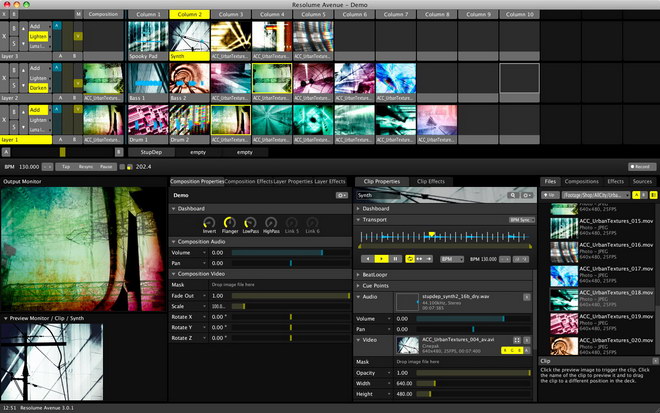
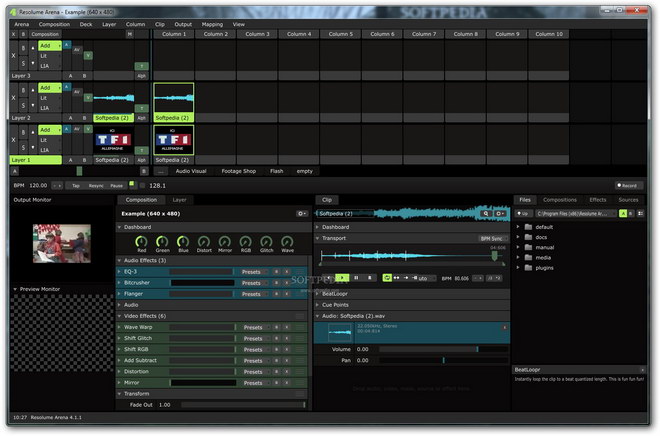
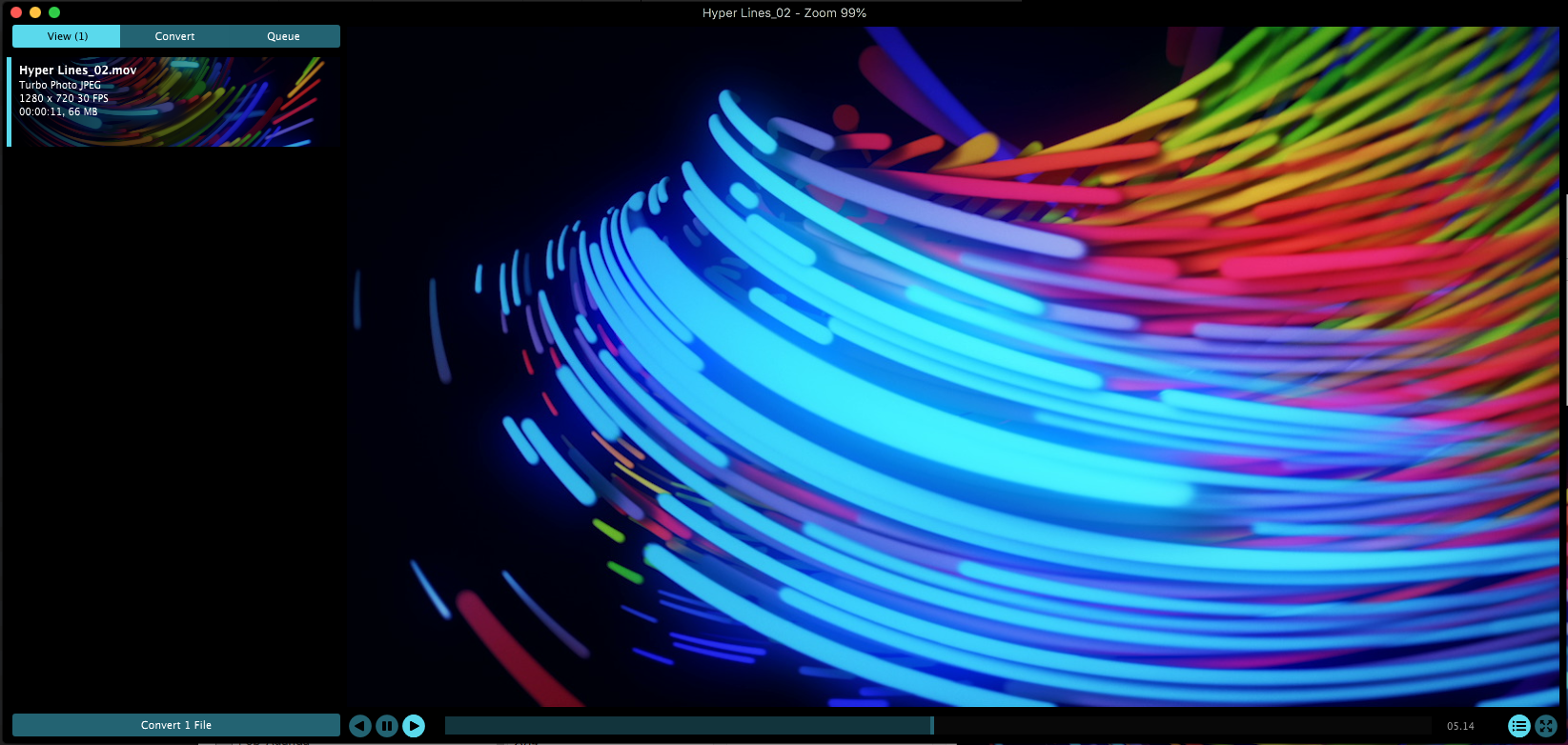



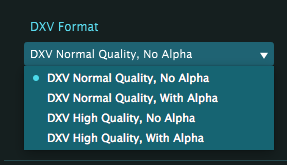 DXV Format
DXV Format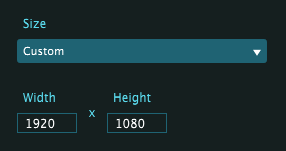 Size
Size